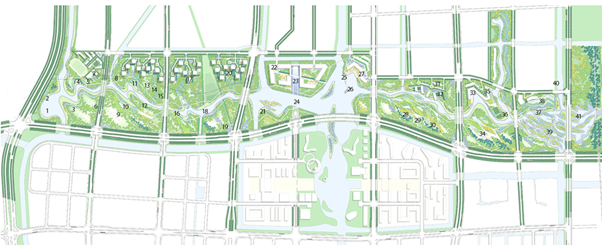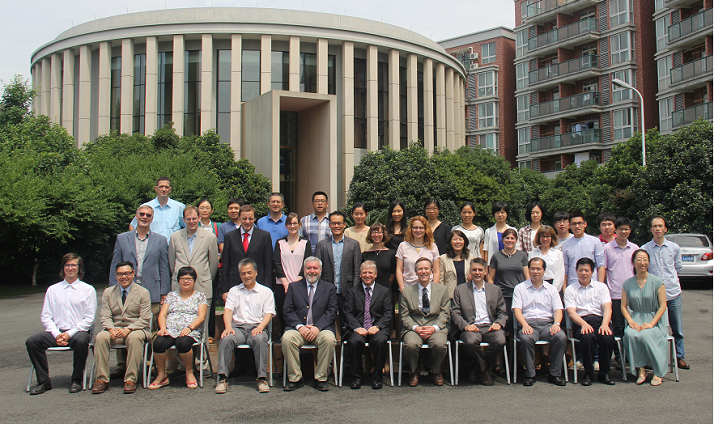Clean Water for All; a UK and US collaboration
The Blue-Green Cities Research team worked with academics from multiple institutions in the North-West US and the University of Nottingham Ningbo China on an EPSRC collaborative research project “Clean Water for All” (CWFA). This built on the collaborative partnerships with American colleagues engaged in NSF-funded research that complements, without duplicating, that of Blue-Green Cities.
Read more about the Clean Water for All Research in our Inception Report  (1 MB, V5 28.4.14)
(1 MB, V5 28.4.14)
Research Topics
- Climate change and flood risk: understanding and communicating risk and uncertaintyModelling flows and water quality in the urban water cycle (runoff and flood simulation)
- The influence of Green Streets, Blue-Green Infrastructure and river restoration on waterway health and water quality
- Community perceptions of blue-green infrastructure in the urban environment: the social dynamic
- System interactions and the generation of multiple benefits of Blue-Green infrastructure
- Structuring and evaluating community priorities through participatory modellingKey
Research Questions
- What are the relevant dominant uncertainties for urban Blue-Green design and decision making?
- How might Blue-Green features be included in a hydrodynamic model for unpaved streets?
- What influence do river restoration activities have on water quality, riparian habitat and river health?
- What are the perceived benefits of Blue-Green infrastructure and how do perceptions change over time?
- What is the benefit intensity and benefit profile of different Blue-Green infrastructure types?
- Where/when is it appropriate to use Bayesian networks as a tool to structure stakeholder understanding and communicate views?
Research Team
Research in all three projects falls within EPSRC’s stated priority area of “water engineering within the context of Sustainability and Resilience” and coincides with topics on: water reuse, storm water use, urban water sustainability, and resilience of water infrastructures. Blue-Green Cities worked with US academics involved in PVU ULTRA-Ex.
PVU ULTRA-Ex examined the role of governance for a pair of cities, Portland, Oregon and Vancouver, Washington, which have developed over the past several decades under contrasting policy regimes at the state, regional, and local levels. The project investigated how differences in local and state levels of governance and policy affect the resilience of both social and ecological landscapes, and how monitoring ecosystem services may provide a usable feedback loop in urban socio-ecological systems.
Research Schedule
There were three stages to this research;
-
Initial workshop (Newcastle, UK) March 2014
-
Collaborative research in Oregon during one-week visits by the academics and 30-day periods of targeted, intensive research by their research associates and students (May 2014)
-
Wrap-up and Dissemination Event (June 2015) at the University of Nottingham Ningbo Campus (UNNC)
Outputs
Urban Water and Flood Risk Management: The Blue-Green Advantage
A China-UK-US Knowledge Exchange Workshop
University of Nottingham Ningbo Campus (UNNC)
June 15-18, 2015
Dissemination event for 'Clean Water for All' research

Through innovative synthesis of topography, hydrology and vegetation, the Ningbo Eco-Corridor project transforms an uninhabitable brownfield into a 3.3 km long “living filter” to restore a rich and diverse ecosystem, create synergy between human activity and wildlife habitat, and serve as valuable teaching tool and model for sustainable urban expansion and development.
Knowledge Exchange Workshop and Symposium (June 2015)
This event brought together UK-US-Chinese academics who had worked together since 2014 on the ‘Clean Water for All’ (CWFA) initiative (funded by the EPSRC). The event was an opportunity to present some of the results of the CWFA project and to facilitate the exchange of knowledge and experience on the advantages of using integrated drainage systems, best management practices and Blue-Green infrastructure to provide sustainable and resilient urban water, flood risk and environmental management.
Day 1 consisted of presentations from the UK, US and Chinese research leaders and talks from external speakers, including Prof Xiaotao Cheng (Institute of Water Resources and Hydropower), Fang Zhang (Ningbo Planning Bureau) and Simon Spooner (Atkins).
Day 2 involved a visit to the Ningbo Eco-Corridor Project, a local best practice example of green infrastructure in a densely urban area, and trip to the Ningbo Hong Tai Water Conservancy Technology Company.
An Urban Water and Flood Risk Management Symposium comprised days 3 and 4, where the UK, US and Chinese academics presented their recent research and best practice in the field of flood risk, water management, Blue-Green infrastructure and restoration.
Read more about this event in our blog.

Outputs from Newcastle workshop (March 17-19th 2014)
 PVU ULTRA-EX Overview, Yeakley et al.
PVU ULTRA-EX Overview, Yeakley et al.
 Effects of Land Cover, Flow, and Restoration on Stream Water Quality in the Portland, OR and Vancouver, WA Metro Area, Chang et al.
Effects of Land Cover, Flow, and Restoration on Stream Water Quality in the Portland, OR and Vancouver, WA Metro Area, Chang et al.
 Climate Change and Preparedness: Drinking water in the Portland, Oregon, region, Ozawa et al.
Climate Change and Preparedness: Drinking water in the Portland, Oregon, region, Ozawa et al.
 ULTRA Economic valuation studies, Netusil et al.
ULTRA Economic valuation studies, Netusil et al.
 Nutrient biogeochemistry in urban ecosystems, Morse et al.
Nutrient biogeochemistry in urban ecosystems, Morse et al.
 Regional Hydro-Ecologic Simulation System (RHESSys), Fisher de Leon et al.
Regional Hydro-Ecologic Simulation System (RHESSys), Fisher de Leon et al.
 PVU ULTRA-Ex summary, Yeakley et al.
PVU ULTRA-Ex summary, Yeakley et al.
Conference Papers 2014-15
Morse J. The influence of stormwater pipes and green infrastructure on sediment biogeochemistry in a rural-to-urban river network. 1st International Workshop on Urbanization in Watersheds Ecological and Environmental Responses (UWEE), 12-17th October 2014, Xiamen, China.
Mant J, Janes V, Terrell R, Allen D, Arthur S, Yeakley A, Morse J, Holman I. Evaluating the effect of river restoration techniques on reducing the impacts of outfall on water quality. European Geosciences Union (EGU) General Assembly, 12-17th April 2015, Vienna, Austria.